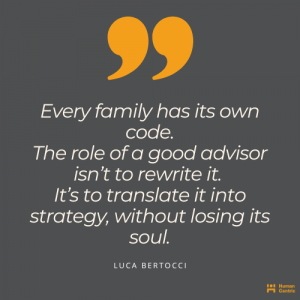What Family-Owned Businesses Can Teach Us About Strategy That Big Corporations Often Miss

Rooted in tradition, driven by conviction — like a well-tended vineyard, strategic execution in family businesses grows strongest when nurtured from the top.
Luca Bertocci’s latest article reveals how family businesses execute strategy better—when top leadership drives quiet, decisive alignment.
Written by Luca Bertocci, university lecturer and co-owner of boutique consultancy Human Centric Group, the article draws from over 20 years of advisory experience with global leaders in sectors such as consumer goods, retail, manufacturing, and technology. Having worked across more than 30 countries, Bertocci distills what actually drives alignment inside organizations where leadership isn’t just a job title—it’s a generational commitment.
Rather than offering a framework or textbook model, Bertocci focuses on lived experience and nuance. He argues that in family businesses, strategy takes hold not because it’s mandated, but because it’s deeply believed.
“When the top is involved—really involved—everything moves differently,” Bertocci writes. “Execution happens, resistance fades, and strategy becomes a shared commitment instead of a PowerPoint.”
Why Family Businesses Outperform
The article challenges corporate assumptions that family-run companies are outdated or resistant to change. In fact, many show extraordinary adaptability and longevity—especially in regions like Italy, Spain, Portugal, and Turkey, where businesses often span multiple generations.
These enterprises don’t follow the same playbook taught in MBA programs. They’re guided by rituals, values, and unwritten rules—what Bertocci calls “quiet strategic intent.” That intent often comes from a founder or heir who may not dominate meetings but whose belief in a project drives decisions across departments.
“Every family has its own code. The role of a good advisor isn’t to rewrite it. It’s to translate it into strategy, without losing its soul,” Bertocci notes.
When owners or senior family members show visible conviction, strategic momentum follows. Teams align. Resistance drops. Middle managers stop buffering and start bridging.
What Big Corporates Often Miss
In large corporations, execution breakdowns are often framed as operational issues. But Bertocci suggests they’re often something else entirely: misalignment at the top.
He outlines familiar symptoms:
• Ideas that stall for lack of sign-off
• Sales teams that “wait for the nod”
• Strategy documents that get bigger, but less clear
• Senior leaders who quietly admit, “I’m not sure what we’re trying to be anymore”
In family businesses, when conviction exists at the highest level, none of these symptoms appear. Everyone knows where they’re going—and why.
A Call for Discreet, Strategic Partnership
The article also makes a compelling case for a role many family companies don’t even realize they need: a discreet strategic advisor who helps them clarify how the brand shows up, internally and externally—not through slogans, but through decisions that are coherent, aligned, and culturally grounded.
Bertocci writes from first-hand experience, having quietly advised multiple owners and boards navigating legacy transitions, rebrands, and cross-generational shifts. He cautions against the use of off-the-shelf consulting models in family enterprises. What works in a public multinational with distributed governance often falls flat in environments driven by history, intuition, and emotional logic.
“Pushing a ready-made solution, even if brilliant, can be like trying to teach a foreign language by raising your voice. It won’t land. Not because they didn’t hear you. Because it wasn’t their language.”
For Those Thinking in Decades, Not Quarters
The article resonates with a specific type of leader—one who sees their company not just as a financial engine, but as a legacy. It also speaks to trusted advisors, board members, and private equity partners working with family-controlled businesses and seeking greater alignment.
Whether you're advising, investing in, or leading a family enterprise, the message is clear: when the top is aligned, execution doesn’t need to be pushed—it flows.
Read the Full Article
The full article “What Family Companies Teach Us About Strategic Execution” is available now at:
Find Your Rehab: Comprehensive Online Directory Releases New Resource on Inpatient Alcohol and Drug Facilities at Solana Beach
NORDEN LEACOX ACCIDENT & INJURY LAW Ranks No. 776 on the 2025 Inc. 5000 List of America's Fastest-Growing Companies
RiteCheck Announces Back-To-School Book Bag Giveaway in the Bronx and Harlem
Więcej ważnych informacji
 Jedynka Newserii
Jedynka Newserii

 Jedynka Newserii
Jedynka Newserii

Konsument

Polacy nie korzystają z hossy trwającej na warszawskiej giełdzie. Na wzrostach zarabiają głównie inwestorzy zagraniczni
Od października 2022 roku na rynkach akcji trwa hossa, nie omija ona także warszawskiej giełdy. Mimo to inwestorzy indywidualni odpowiadają zaledwie za kilkanaście procent inwestycji, a o wzrostach decyduje i na nich zarabia głównie kapitał z zagranicy. Widać to również po napływach i odpływach do i z funduszy inwestycyjnych. Zdaniem Tomasza Koraba, prezesa EQUES Investment TFI, do przekonania Polaków do inwestowania na rodzimej giełdzie potrzeba zysków z akcji, informacji o tych zyskach docierającej do konsumentów oraz czasu.
Polityka
Obowiązek zapełniania magazynów gazu w UE przed sezonem zimowym ma zapewnić bezpieczeństwo dostaw. Wpłynie też na stabilizację cen

Unia Europejska przedłuży przepisy z 2022 roku dotyczące magazynowania gazu. Będą one obowiązywać do końca 2027 roku. Zobowiązują one państwa członkowskie do osiągnięcia określonego poziomu zapełnienia magazynów gazu przed sezonem zimowym. Magazyny gazu pokrywają 30 proc. zapotrzebowania Unii Europejskiej na niego w miesiącach zimowych. Nowe unijne przepisy mają zapewnić stabilne i przystępne cenowo dostawy.
Infrastruktura
Gminy zwlekają z uchwaleniem planów ogólnych zagospodarowania przestrzennego. Może to spowodować przesunięcie terminu ich wejścia w życie

Reforma systemu planowania i zagospodarowania przestrzennego rozpoczęła się we wrześniu 2023 roku wraz z wejściem w życie większości przepisów nowelizacji ustawy z 27 marca 2003 roku. Uwzględniono w niej plany ogólne gminy (POG) – nowe dokumenty planistyczne, za których przygotowanie mają odpowiadać samorządy. Rada Ministrów w kwietniu br. uchwaliła jednak ustawę o zmianie ustawy z 7 lipca 2023 roku, a jej celem jest zmiana terminu obowiązywania studiów uwarunkowań i kierunków zagospodarowania przestrzennego gmin na 30 czerwca 2026 roku. Wskazana data może nie być ostateczna z uwagi na to, że żadna z gmin nie uchwaliła jeszcze POG.
Partner serwisu
Szkolenia

Akademia Newserii
Akademia Newserii to projekt, w ramach którego najlepsi polscy dziennikarze biznesowi, giełdowi oraz lifestylowi, a także szkoleniowcy z wieloletnim doświadczeniem dzielą się swoją wiedzą nt. pracy z mediami.










.gif)

 |
| |
| |
|